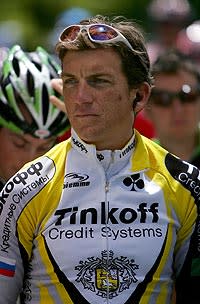Armstrong's legacy takes another hit

They just keep coming for Lance Armstrong, one accusation after the next, one story after another, one old confidant after old racing buddy.
The whispers about the seven-time Tour de France champion using performance-enhancing drugs have turned into on-the-record "60 Minutes" interviews.
The circumstantial (and common sense) doubts have become personal allegations once again, now from a former teammate who claimed direct knowledge of Armstrong taking the blood-booster erythropoietin (EPO).
“I saw [EPO] in his refrigerator. … I saw him inject it more than one time,” Tyler Hamilton told "60 Minutes" in an interview set to air Sunday. “Like we all did. Like I did, many, many times. … [Armstrong] took what we all took … the majority of the peloton [riders]. There was EPO … testosterone … a blood transfusion.”
It's a damning statement for myriad reasons. There's an eye-witness account. There's the first-person credibility of a teammate. There's, maybe most importantly, one more admission that the sport of cycling was chock-full of cheaters during that era.
Yet we're to believe that the man who dominated a sport full of blood dopers was not only a cancer survivor but clean as a whistle? One miracle is a lot. Do you believe in two?
“20+ year career. 500 drug controls worldwide, in and out of competition. Never a failed test. I rest my case,” Armstrong tweeted in response.
It may rest his case but it won't end the deliberations.
Unfortunately for Armstrong, trust in the anti-doping tests of that era is low – and continues to weaken as more and more cyclists come clean. The sport was clearly a mess, yet the doping system could be beat with some regularity. It either makes Armstrong's record more unbelievable or, well, more unbelievable.
At this point, it probably doesn't matter.
Most people have made up their mind about Lance. Many think he's a cheat. Many others (maybe many more) think he's a hero – mostly for his ability to provide comfort and inspiration to cancer patients around the globe.
It's from those cancer wards where his strength remains. He was diagnosed with testicular cancer in 1996. It soon spread to his lungs, stomach and brain, requiring four rounds of brutal chemotherapy. The Armstrong that emerged was an even greater cyclist, going on to win every Tour de France from 1999 through 2005.
To the similarly afflicted, his recovery made anything seem possible. In the broader view of aiding humanity, the millions of sick he helped through Livestrong count for far more than any bicycle race.
Still, years after he faded as a top-line athlete and three months after his full retirement, the accusers keep coming forward, almost like clockwork. Armstrong was always a controlling personality, a tough talking, in-your-face Texan and suddenly he's hopeless to this recurring barrage.
There have been books and newspaper investigations and criticism from respected racers. A year ago it was former teammate Floyd Landis who claimed first-hand knowledge of Armstrong taking EPO, which increases red blood cell counts that guard against tiring. Now it's Hamilton, who was a trusted teammate as Armstrong won the Tour in 1999, 2000 and 2001.
Armstrong's team has blasted Hamilton's credibility, the way it did with Landis. Both riders had previously lied about their own performance-enhancing drug use.
“Hamilton is actively seeking to make money by writing a book, and now he has completely changed the story he has always told before so that he could get himself on '60 Minutes' and increase his chances with publishers,” Armstrong's attorney, Mark Fabiani, told the Associated Press in a statement. “But greed and a hunger for publicity cannot change the facts: Lance Armstrong is the most tested athlete in the history of sports: He has passed nearly 500 tests over twenty years of competition.”
Actually both Hamilton and Landis have claimed Armstrong failed a drug test in 2001, although why that result has never come out is unanswered. And U.S. investigators have asked for a frozen urine sample from the 1999 Tour de France, according to the AP.
Until there's definitive proof – and maybe even after – all we have is word against word. Armstrong's is forceful, but the other side is growing in numbers.
And while Hamilton has changed his story, that isn't unexpected for a guy who was cheating. He also may, indeed, be looking for a book deal, but going on national television and giving away the best parts of the story before having a tome to sell would redefine foolish. If money was his motivation, he would've written now and talked later. That said, Hamilton offered surprisingly few details (exact dates, locations, etc.) in the "60 Minutes" clip released on Thursday.
Mostly there is the growing mountain of doubt that what Armstrong did was even possible.
The sport was undeniably dirty. The riders were desperate for any edge. The drugs that can make climbing an Alp more bearable were all over the place.
To think the king who rose above this era of epic cheats and laid waste to the competition like no mortal ever was innocent requires an immense amount of faith.
All these years later and Lance Armstrong still says he's clean. All these years later his old teammates keep stepping up to say otherwise.
Neither the defense, nor the debate, nor the legend of Lance is anywhere near resting.
Other popular stories on Yahoo! Sports:
• NBA hopeful's comments spark feud with player
• Derrick Williams thinks he can replace LeBron
• Nats GM confronts ump after blown call
